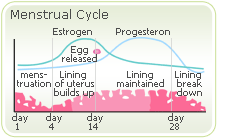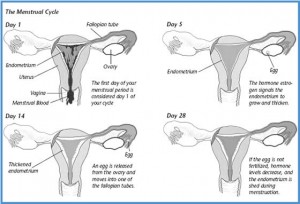Introduction:
Irregular menses or irregular periods are an abnormal variation in the length of the menstrual cycles in a female. Normal length variations of up to eight days between the shortest and longest cycle lengths are usually experienced by almost every woman. Length variation between 8 – 20 days is considered as moderately irregular cycles and a variation of 21 days or more is considered very irregular.
Subsequently, a single menstruation period may be considered as irregular if it is shorter than 21 days, or longer than 36 days. If they are regularly shorter than 21 days, or longer than 36 days, the condition would rather be termed polymenorrhea or oligomenorrhea, respectively.
Irregularity of menses is also determined by the quantity and duration of the menstrual flow.
Types of irregular menstrual conditions:
- Metrorrhagia, generally refers to vaginal bleeding which occurs between the expected menstrual periods. It is menstrual spotting between periods which occurs as a normal and harmless part of ovulation.
- Oligomenorrhea generally refers to infrequent menstruation; it is menstrual periods occurring at intervals of greater than 35 days, with only four to nine periods in a year.
- Polymenorrhea is the medical term for cycles with intervals of 21 days or fewer. This can be regarded as the opposite of Oligomenorrhea.
- Menorrhagia is abnormally heavy and prolonged menstrual bleeding at regular intervals.
What causes irregular menses?
Every woman will experience an irregular period from time-to-time, and though, in most cases, they aren’t dangerous, it’s important to figure out the reason for the irregularity. Here are a few common causes stating why you may be experiencing an abnormal flow.
Hormonal Irregularities:
Despite the fact that many hormones play a part in menstruation, progesterone and estrogen are the leading causes.
Estrogen –> thickens the uterine lining before ovulation –> levels of estrogen constantly change, the uterine lining is often shed irregularly and this is one of the causes of irregular periods.
Progesterone –> responsible for triggering the shed of the uterine contents after ovulation when fertilization hasn’t occurred.
Progesterone –> also controls the intensity and duration of menstrual bleeding.
Any irregularity in the production of the above hormones leads to irregular menses.
Pregnancy:
When pregnant, the female body produces different levels of hormones that cause menstruation to stop. In some cases, however, women will experience lighter-than-normal flows or late periods before menstruation ends altogether.
Stress:
Stress is the most common cause of irregular periods. Cortisol, the stress hormone, has a direct impact on how much estrogen and progesterone, is produced by the body. Too much cortisol in your bloodstream, will cause the time and flow of your cycle to change.
Diet:
Another common reason is the food you eat. If you eat a diet that’s rich in unhealthy carbohydrates or if you’ve gained weight, your body will produce varying levels of certain hormones, shifting your ovulatory date. The same goes for women as they lose weight.
Birth control pills:
It can take several months for your body to get used to the dose of hormones birth control pills deliver.
Drinking too much alcohol:
The liver helps regulate a woman’s menstrual cycle by metabolizing estrogen and progesterone. Excessive drinking can cause damage to the liver and may interfere with how well it metabolizes both period-normalizing hormones.
Polycystic ovary syndrome:
A fairly common complication, this condition causes cysts to form on the ovaries, interfering with regular ovulation. Other symptoms of the condition include hair growth, weight gain, dandruff and infertility. Complications include endometriosis, ovarian cancer and heart disease.
Menopause:
As with pregnancy, this time of life happens when hormone levels in the body begin to shift. The production of both estrogen and progesterone begins to decrease prior to menopause, thus making periods irregular. Irregular periods can start as early as 10 years before menopause sets in (usually when a woman is in her late 40s or early 50s).
Taking medications:
If you were recently sick and had to take medication, your period may show up a day or two late. That’s largely because most medications interfere with the way your body produces oestrogen and progesterone.
Gynaecological problems:
In cases like uterine fibroids and polyps, there is severe prolonged bleeding.
Investigations:
The investigations that are usually done to determine the causes of irregular menses are as follows:
- Free T3 , Free T4, TSH
- Serum Prolactin
- Serum Testosterone – Free & Total
- DHT
- FSH
- Serum Insulin – Fasting & Post Prandial
- CBC
- USG – Pelvis
Homoeopathic Approach in treating irregular menses:
Most cases of irregular menses are often associated with a psychosomatic cause and Homoeopathy helps in treating such causes and removing them from the root level. The stress levels for every woman are so high that, in turn it leads to the hormonal imbalance thus causing irregularities in their menstrual cycles. There have been many researches made with regards to menstrual complaints and homoeopathy and it is a well proven fact that homoeopathy is highly suggested in treating menstrual irregularities.
Irregular menses treated in the conventional method is usually with the help of hormonal supplements etc which have a temporary effect as long as the medicines are being taken. Homoeopathy helps in targeting the root cause of the problem and thereby treats the causes for menstrual irregularities from within. The main aim and objective of Homoeopathy has been to treat a person individually and relieve her of her symptoms from within.
Since it is known that the root cause of all menstrual irregularities is the disturbed hormonal functioning of the body, it can be easily perceived that this constitutional disorder will require a constitutional approach towards its correction and eventually cure.
The homoeopathic treatment for irregular menses is based on an extensive case study of the patient with regards to her characteristic symptoms, genetic predisposition, and her mental state. The total time taken for the treatment differs from person to person depending on the duration, intensity and frequency of the suffering, maintaining causes, susceptibility and general health of the patient.
Whatever is a core emotional issue for you tends to worsen around your period or during hormonal changes. For example, if you have occasional feelings of low self -confidence and depression or carry around resentment or anger, you may notice them heightening around the times of your hormonal changes. Your hormones may be intensifying these feelings during these times. Homeopathy not only addresses the imbalance of your hormones, but heals the underlying mental or emotional pain that you may be harboring underneath. This phenomenal system creates a sense of equilibrium by healing on a deep level, rather than just treating or suppressing outward symptoms. With the correct homeopathic remedy, the body and mind will regain the vitality and balance it once had without the use of chemicals or guesswork on our systems. Homoeopathic medicines act at the root level and thus bring back deviations of hormonal system back to normalcy and in many cases abolish the need for conventional hormonal supplements, thereby avoiding their side-effects.
It is therefore advisable to choose Homoeopathy for treating your menstrual irregularities, because it treats the illness from within and removes it at its root level with a long term relief and without any side effects.
How Dr. Neha Seth can help you with your irregular menses?
Dr. Neha Seth believes in giving the patient immediate relief with a shorter period of treatment. The prime line of treatment is to consider every disease to be a result of an allergy. The patient is first asked to get her Serum IgE levels done. The Serum IgE levels would be high in every patient. To know the allergen that is causing the disease, an allergy test is done. There are two types of allergy tests that are done – a blood test and a skin test. Usually the skin allergy test is asked for; reason being it costs 1/10th the cost of the blood test. With the help of the allergy test, the allergen is identified and treated accordingly. The patient is immediately asked to stop consuming that food item which is the primary allergen. Since the maintaining and the causative factors are now known, homoeopathy works wonderfully once these causes are removed. The patient can therefore see the decrease in the complaints she suffered during each menstrual cycle.






